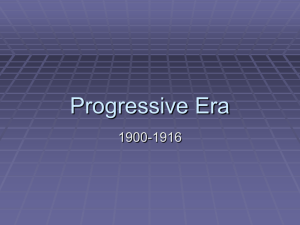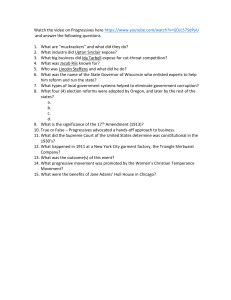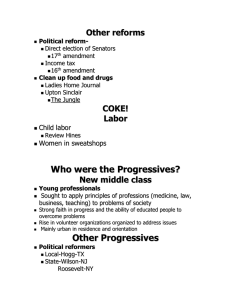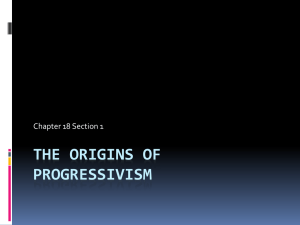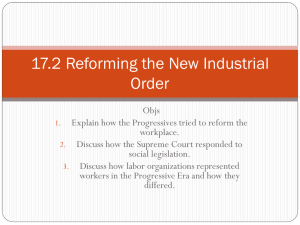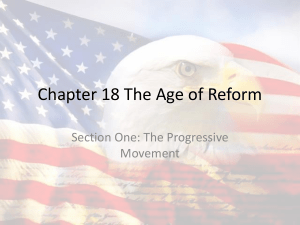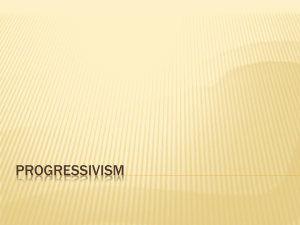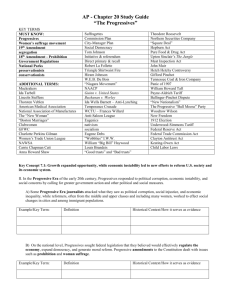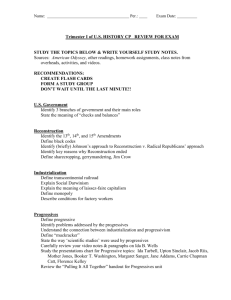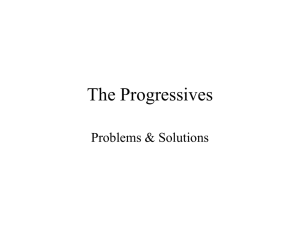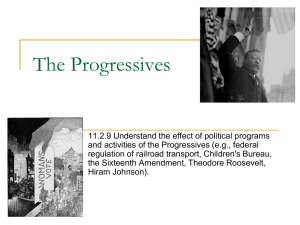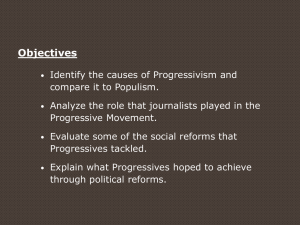The Progressives powerpoint
advertisement
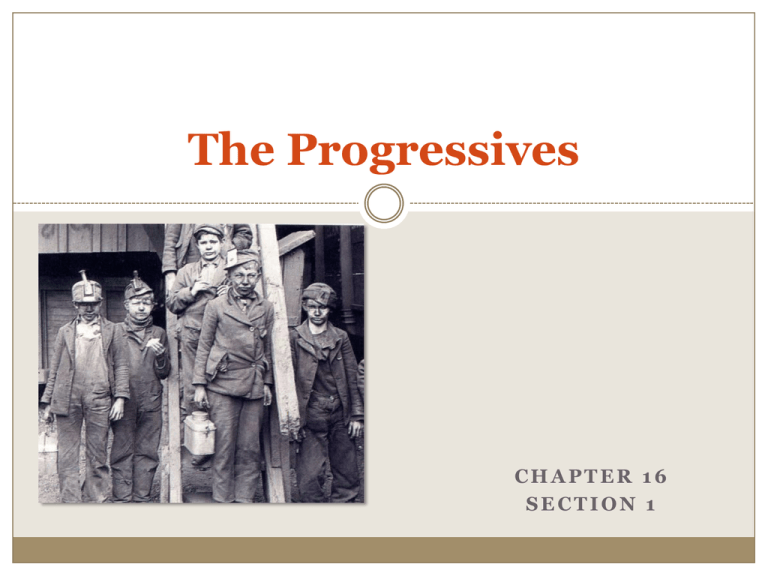
The Progressives CHAPTER 16 SECTION 1 What were you doing when you were 8 years old? Think about it… What laws are in place for workers that are under the age of 18? What if I told you that women can not vote? Information? If you wanted to find out about Hurricane Irene, how would you do that? If I asked you when the Steelers play the Ravens, what would you do? How did people in the 1900’s get their information? Was the majority of the population LITERATE? Could people in Pittsburgh know what was happening in Chicago? New York? Somerset? This was the norm, not the exception… Who were the Progressives? (Ch. 16, Section 1, pg. 522) Progressives focused on three areas of reform: 1. Easing the suffering of the urban poor 2. Improving unfair and dangerous working conditions 3. Reforming government at the national, state, and local levels. The people who wanted these changes were called progressives. Why do you think they were called progressives? Muckrakers Writers were the first to expose many of the social ills that Progressives (or the reformers) targeted. Magazines were very popular at this time Popular magazines printed journalist’s firsthand accounts of injustices and horrors they had witnessed. They were called muckrakers because they “raked up” or exposed the filth of society. Primary Sources: Ida Tarbell (pg. 523) Who was Ida Tarbell? Questions to think about: What did she do? How did she describe the leaders Of Standard Oil? What do you think she hoped to Achieve by publishing her articles? Ida Tarbell Reported on the corrupt practices of the Standard Oil Company SOC pressured independent oil companies to give up their lawsuits against SOC. 1880 victory withdrew all of the lawsuits Made it fair, not a monopoly Why do you think she published her articles? Muckrakers Video Discovery Ed Video Issue #1: Reforming Society By 1920, more than half of Americans lived in cities. Why? Tenenment Act of 1901: Forced Landlords to install lighting in public hallways Provide at least 1 toilet for every two families! Think about it!!! How can something like this Act contribute to a drop in the death rate? Civil Rights – Major Organizations formed at this time…. NAACP National Association for the Advancement of Colored People Fought for equal rights Protested segregated government W.E. B. Du Boise and Jane Addams were strong activists ADL Anti-Defamation League Sigmund Livingston, Jewish man living in Chicago Goal: Fight Anti-Semitism, or hostility towards Jews What challenges did these activists face? Is it easy to stand for what you believe in? #2: Reforming the Workplace Progressives wanted to improve the working conditions for women & children 40% of Americans were living in poverty Progressives and Labor Unions fought to secure laws ensuring workers a minimum wage. What is a union? A union is an organized group of workers who come together to make decisions about the conditions of their work. Through union membership, workers can impact wages, work hours, benefits, workplace health and safety, and other work-related issues. What is considered poverty today? 2011: 2011 HHS Poverty Guidelines Persons in Family 48 Contiguous States and D.C. Alaska Hawaii 1 $10,890 $13,600 $12,540 2 14,710 18,380 16,930 3 18,530 23,160 21,320 4 22,350 27,940 25,710 The state or condition of having little or no money, goods, or means of support; condition of being poor. Synonyms: privation, neediness, destitution, indigence, pauperism, penury. Antonyms: riches, wealth, plenty. 14.3% (or 1 in 7 Americans) Graphic Organizer Problems in the workplace Triangle Shirtwaist Company Fire Tragic event in NYC that killed 154 women and children Turning point for reform in factories What safety precautions are in place in our high school that stemmed from this event? http://law2.umkc.edu/faculty/projects/ftrials/triangle/t rianglenewsaccounts.html http://www.ilr.cornell.edu/trianglefire/ Discovery Education Video #3: Reforming Government Progressives wanted to eliminate political corruption and make government more efficient. Think: Mafia (Discuss) Reforms were made at the city, state, and federal level. CITY LEVEL: Development of commission plan (Commissioners were experts in their field rather than party loyalists). http://www.city.pittsburgh.pa.us/cp/html/planning_commiss ion.html State Level Robert M. La Follette Use your textbook to answer the following: 1. What was the Wisconsin Idea? 2. Why would it be important to limit campaign spending? 3. Why were railroads so important to regulate at this time? Robert M. La Follette 1. Wisconsin Idea: Ambitious agenda of reforms (He was the governor of WI) 2. Limit on Campaign spending? Important because it created an even playing field for those running for office. If there was no limit, only those with money and power would be elected. 3. Importance of Railroads? Only means of transportation throughout the nation at this time. Carried people and goods. Vocabulary
